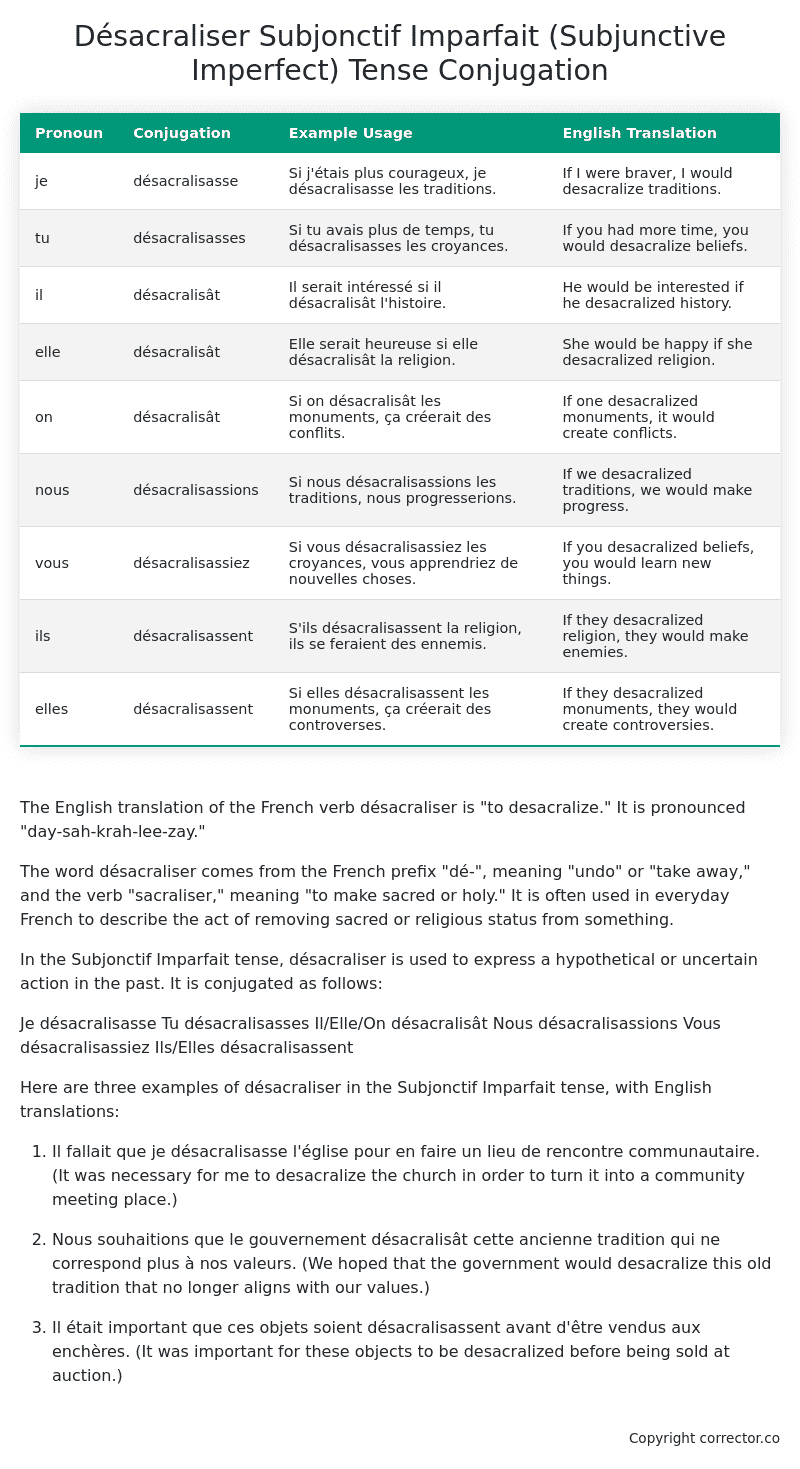Subjonctif Imparfait (Subjunctive Imperfect) Tense Conjugation of the French Verb désacraliser
Introduction to the verb désacraliser
The English translation of the French verb désacraliser is “to desacralize.” It is pronounced “day-sah-krah-lee-zay.”
The word désacraliser comes from the French prefix “dé-“, meaning “undo” or “take away,” and the verb “sacraliser,” meaning “to make sacred or holy.” It is often used in everyday French to describe the act of removing sacred or religious status from something.
In the Subjonctif Imparfait tense, désacraliser is used to express a hypothetical or uncertain action in the past. It is conjugated as follows:
Je désacralisasse
Tu désacralisasses
Il/Elle/On désacralisât
Nous désacralisassions
Vous désacralisassiez
Ils/Elles désacralisassent
Here are three examples of désacraliser in the Subjonctif Imparfait tense, with English translations:
-
Il fallait que je désacralisasse l’église pour en faire un lieu de rencontre communautaire.
(It was necessary for me to desacralize the church in order to turn it into a community meeting place.) -
Nous souhaitions que le gouvernement désacralisât cette ancienne tradition qui ne correspond plus à nos valeurs.
(We hoped that the government would desacralize this old tradition that no longer aligns with our values.) -
Il était important que ces objets soient désacralisassent avant d’être vendus aux enchères.
(It was important for these objects to be desacralized before being sold at auction.)
Table of the Subjonctif Imparfait (Subjunctive Imperfect) Tense Conjugation of désacraliser
| Pronoun | Conjugation | Example Usage | English Translation |
|---|---|---|---|
| je | désacralisasse | Si j’étais plus courageux, je désacralisasse les traditions. | If I were braver, I would desacralize traditions. |
| tu | désacralisasses | Si tu avais plus de temps, tu désacralisasses les croyances. | If you had more time, you would desacralize beliefs. |
| il | désacralisât | Il serait intéressé si il désacralisât l’histoire. | He would be interested if he desacralized history. |
| elle | désacralisât | Elle serait heureuse si elle désacralisât la religion. | She would be happy if she desacralized religion. |
| on | désacralisât | Si on désacralisât les monuments, ça créerait des conflits. | If one desacralized monuments, it would create conflicts. |
| nous | désacralisassions | Si nous désacralisassions les traditions, nous progresserions. | If we desacralized traditions, we would make progress. |
| vous | désacralisassiez | Si vous désacralisassiez les croyances, vous apprendriez de nouvelles choses. | If you desacralized beliefs, you would learn new things. |
| ils | désacralisassent | S’ils désacralisassent la religion, ils se feraient des ennemis. | If they desacralized religion, they would make enemies. |
| elles | désacralisassent | Si elles désacralisassent les monuments, ça créerait des controverses. | If they desacralized monuments, they would create controversies. |
Other Conjugations for Désacraliser.
Le Present (Present Tense) Conjugation of the French Verb désacraliser
Imparfait (Imperfect) Tense Conjugation of the French Verb désacraliser
Passé Simple (Simple Past) Tense Conjugation of the French Verb désacraliser
Passé Composé (Present Perfect) Tense Conjugation of the French Verb désacraliser
Futur Simple (Simple Future) Tense Conjugation of the French Verb désacraliser
Futur Proche (Near Future) Tense Conjugation of the French Verb désacraliser
Plus-que-parfait (Pluperfect) Tense Conjugation of the French Verb désacraliser
Passé Antérieur (Past Anterior) Tense Conjugation of the French Verb désacraliser
Futur Antérieur (Future Anterior) Tense Conjugation of the French Verb désacraliser
Subjonctif Présent (Subjunctive Present) Tense Conjugation of the French Verb désacraliser
Subjonctif Passé (Subjunctive Past) Tense Conjugation of the French Verb désacraliser
Subjonctif Imparfait (Subjunctive Imperfect) Tense Conjugation of the French Verb désacraliser (this article)
Conditionnel Présent (Conditional Present) Tense Conjugation of the French Verb désacraliser
Conditionnel Passé (Conditional Past) Tense Conjugation of the French Verb désacraliser
L’impératif Présent (Imperative Present) Tense Conjugation of the French Verb désacraliser
L’infinitif Présent (Infinitive Present) Tense Conjugation of the French Verb désacraliser
Struggling with French verbs or the language in general? Why not use our free French Grammar Checker – no registration required!
Get a FREE Download Study Sheet of this Conjugation 🔥
Simply right click the image below, click “save image” and get your free reference for the désacraliser Subjonctif Imparfait tense conjugation!

Désacraliser – About the French Subjonctif Imparfait (Subjunctive Imperfect) Tense
Formation
Common Everyday Usage Patterns
Interactions with Other Tenses
Subjonctif Présent
Indicatif Passé Composé
Conditional
Conditional Perfect
Summary
I hope you enjoyed this article on the verb désacraliser. Still in a learning mood? Check out another TOTALLY random French verb conjugation!


